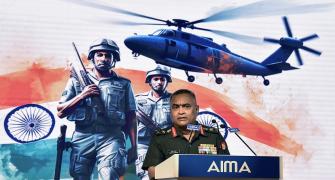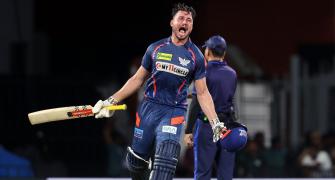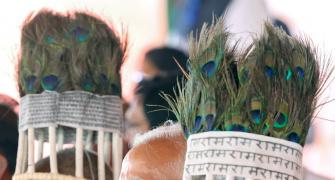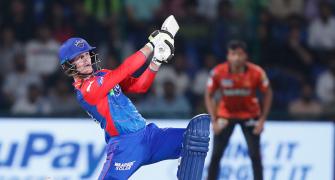Never mind the Parveen Babis, Kimi Katkars, Sonams and even Sheebas. For sheer sensual potency, no one can hold a candle to the ultimate physical statements that are Zeenat Aman in the 1970s and Bipasha Basu in this millennium.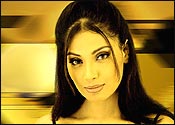
Three decades have passed since Zeenie Baby first stunned audiences with chartbusters and blockbusters changing the very concept of the desi diva. She simply attired the Hindi film heroine with a fresh, sexy ensemble of Western ethos, pizzazz and high voltage sensuality that had less to do with costumes and cleavage than body language, incendiary eye talk and an open flaunting of innate sex appeal.
This was no coquettish 1950s maiden or 1960s belle trying out a director's interpretation of sexuality, but a natural siren whose comfort level with being a sex symbol was as high as a hand with a perfectly matched glove. She relished the tag of Zeenie Baby and was the pathbreaker who, even if a shade ruefully, exploited her special qualities to almost topple Hema Malini, the epitome of Indian womanhood, from the top slot.
She says, "I do agree I missed out on a lot of meaty roles because of this image, but it feels wonderful to be remembered and addressed even now as Zeenie Baby. It worked for me."
Perhaps it is a quirk that Zeenat's pet name Babusha is so close phonetically to the one woman who may be said to be her natural successor among all those who have travelled since: Bipasha Basu. Perhaps it is in the natural order of things that a live testosterone booster should make a mark after a string of antiseptic toppers like Karisma Kapoor, Aishwarya Rai, Preity Zinta and Kareena Kapoor.
Or maybe a shift was needed, now that the 2000s signify paradigm changes in trends and lifestyles the way the early 1970s did.
Interestingly, Zeenat and Bipasha have more than one area of similarity. Their magnetically scintillating (skin-tillating?) personnae have a lot more in common than their glamorous backgrounds before their film careers: Zeenat Aman was Miss India and later Miss Asia-Pacific, Bipasha was Supermodel 1996; and of course their successful forays in modelling and the ramp.
The word Zeenat translates very broadly as 'beauty.' She undoubtedly was. With (a lot of) brains attached. The word Bipasha means 'deep, dark desire' as well as the river Beas in its original Sanskrit terminology.
Zeenat heralded the advent of the slim, svelte, immaculately groomed heroine in place of the full-bodied figure that Indians till then used to 'plump' for. Bipasha too may be said to have brought about a small revolution. In the days of a flood of aerobic-thin 'girl' figures, she was the woman with perfect statistics, with an erotic appeal that could be probably best described as lustrous.
The academic fronts of Babusha and Bonny (as they are respectively known within family) have strong areas of confluence: Zeenat was always the scholar, a head girl at her Panchgani boarding school, a girl who at 17 flew to Los Angeles on a scholarship.
Bipasha Basu, the cleverest of three siblings, studied science till std XII and then opted to contest -- and win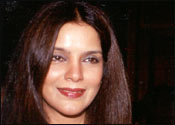 -- the Ford Supermodel contest.
-- the Ford Supermodel contest.
Zeenat was literally pressured into entering the Miss India pageant by friends.
The domestic picture could not have been more diverse -- Zeenat's parents divorced in her infancy. She lived a predominantly boarding school life, while Bipasha enjoyed the warmth and affection of a family complete with a strict, but concerned, father, an easygoing mother and two sisters.
When it came to their arrival in films, there was an obvious meeting point. Both signed several films even before their first releases. If Bipasha debuted as a gold digger femme fatale in Abbas-Mustan's thriller Ajnabee and stole the show from under Kareena Kapoor, Zeenat's first significant release, Hare Rama Hare Krishna, saw her upstaging the reigning queen of the marquee, Mumtaz.
To be fair, both Zeenat and Bipasha had author-backed roles. But to be fairer, they both entered brilliantly under the skin of their respective characters Jasbir-turned-Janice and Sonia.
Thus, we come to the second aspect of their unconventional personalities: the non-white roles they both essayed to win a passport to stardom. Zeenat portrayed the child of a broken home who turns into a drug addict, while Bipasha was the gold-digger lover of a like-minded scoundrel.
In mainstream cinema, Zeenat and Bipasha both went beyond the two heroines before them who merely drew first attention via the negative route -- Waheeda Rehman with CID and Mumtaz with her vamp act in Mere Sanam.
Interestingly again, the next celluloid outing of both Zeenat and Bipasha were chilling suspense dramas that saw the sirens do a volte face and turn into pativrata wives of despicable husbands. Zeenat was the long-suffering wife of the despotic Danny Denzongpa in Dhund (and later his widow who was the key suspect in his murder), and Bipasha the woman who fights for her selfish and philandering suhaag-in-danger in Raaz.
Both films were moneyspinners.
If Waheeda and Mumtaz overwhelmingly stuck to the straight and narrow after achieving success, Zeenat and Bipasha did not. Extending the parameters of unconventionality beyond the grey or negative roles, they played 'tough guys' too. Zeenat was the saucy call girl of Manoranjan, the assertive child-refusing wife of Ajnabee (another meeting point between Zeenat and Basu. Zeenat costarred with Rajesh Khanna, while Bipasha romanced Khanna's real-life son-in-law Akshay Kumar); the hep con-woman of Chori Mera Kaam, the daku in Daku Hasina and the gritty victim of rape who fights to the last in Insaaf Ka Tarazu.
Bipasha too went a shade beyond her ruthless Ajnabee act to enact the calculating, cold-blooded murderess in her latest success story, Jism, where she extends the connotations of her name to express The Dark Side Of Desire, the film's blurb .
.
She also copped it in two diametrically different ways -- in the David Dhawan disappointment Chor Machaaye Shor and in the gloomy Gunaah, where she plays a rough talking policewoman who falls for a killer. She has expressed a strong desire to play a mixed bag of roles, exercising her prerogative to be sexy ('till I am 100!') as well as a substantial actress.
Zeenat Aman too is pushing her boundaries now. The only film she is doing now -- Kaizad Gustad's Boom! -- has her portraying an all-black character for the first time. She has admitted to enjoying her never before role the way Bipasha revelled in Jism!
Perhaps it is significant that the only megastar of the last three decades, Amitabh Bachchan, is the only star common to both of them. Though Bipasha will have AB as her daddy rather than beau in Aitbaar. Professionally, we also see in both Zeenat and Bipasha a certain degree of choosiness and a fine-tuned involvement, dedication and earthiness that makes them 'repeat value' material for their filmmakers.
Of course, there is one area in which Bipasha lags way behind Zeenat -- the quality of music. Zeenat was inspiration unlimited for music savvy filmmakers and titanic music makers like R D Burman, Laxmikant-Pyarelal and Kalyanji Anandji, unleashing a musical hit parade that even today is evergreen and remix fodder.
A significant quantum of her sustained popularity was thanks to her flair for enacting songs in her own stylised manner, often lacing them with erotic tenor as in Dum maro dum (Hare Rama Hare Krishna), Haye haye yeh majboori (Roti Kapada Aur Makaan), Baat ban jaaye (Qurbani) and the title track of Satyam Shivam Sundaram.
Bipasha has had hit music in Raaz and great music in Jism, but you cannot remember a single Bipasha-driven hit other than the nonsensically-worded Tu sirf mera mehboob from her debut film Ajnabee. That is one price that Bipasha will have to pay for perhaps coming in 30 years too late!
The permanent deficiency of Bollywood is its lack of cerebral and imaginative scriptwriters. Who wouldn't love to have these deadly damsels cast in pithy roles opposite each other, maybe as mother and daughter, or antagonists?
Would that be much to take for the male audiences?


